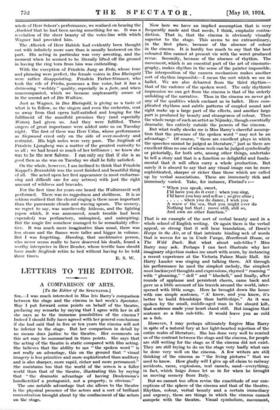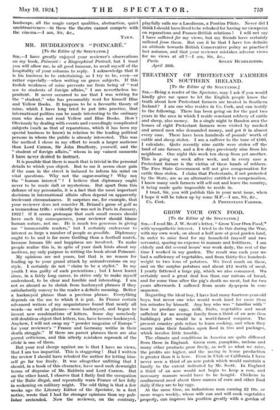LETTERS TO THE EDITOR.
A COMPARISON OF ARTS.
[To the Editor of the SPECTATOR.] SIR,-I was much interested in Miss Iris Barry's comparison between the stage and the cinema in last week's Spectator. May I put forward some points on behalf of the theatre, prefacing my remarks by saying that I agree with her in all she says as to the immense possibilities of the cinema ? Indeed I should fully have agreed with her general conclusions if she had said that in five or ten years the cinema will not be inferior to the stage. But her comparison in detail by no means does justice to the theatre. Her comments on this art may be summarized in three points. She says that the acting of the theatre is static compared with film acting. She believes that the ability to use " the spoken word " is not really an advantage, this on the ground that " visual imagery is less primitive and more sophisticated than auditory and is also sharper, more rapid, richer and more permanent." She maintains too that the world of the screen is a fuller world than that of the theatre, illustrating this by saying that " the dramatic advantage of having Desdemona's handkerchief a protagonist, not a property, is obvious."
The one notable advantage that she allows to the theatre is the physical presence of the actors and a sort of brilliant concentration brought about by the confinement of the actors on the stage.
Now here we have an implied assumption that is very frequently made and that needs, I think, emphatic contra- diction. That is, that the cinema is obviously visually superior to the stage. This seems to me extraordinary, in the first place, because of the absence of colour in the cinema. It is hardly too much to say that the best coloured film cannot at present vie with the worst produced revue. Secondly, because of the absence of rhythm. The movement, which is an essential part of the art of cinemato- graphy, makes rhythm in the sense of the painter impossible. The interposition of the camera mechanism makes another sort of rhythm impossible—I mean the sort which we see in ballet. We are also debarred from the third rhythm— that of the cadence of the spoken word. The only rhythmic impression we can get from the cinema is that of the orderly unfolding of the narrative. Thus in the cinema we never get any of the qualities which enchant us in ballet. Here com- plicated rhythms and subtle patterns of coupled sound and sight make up a large part of the effects, and another large part is produced by beauty and strangeness of colour. Thus the whole range of such an artist as Nijinsky, though essentially dramatic, lies entirely outside the powers of the cinema.
But what really shocks me is Miss Barry's cheerful assump- tion that the presence of the spoken word " may not be an advantage." Of course, " there are excellent plays in which the speeches cannot be judged as literature," just as there are excellent films no one of whose reels can be judged symbolically or pictorially, for both arts, among other things, undertake to tell a story and that is a function so delightful and funda- mental that it will often carry a whole production. But surely it is absurd to say that any visual image can be more sophisticated, sharper or richer than those which are called up by verbal associations. These are immensely rich and immensely varied. Take, for instance, Florizel's ;— " When you speak, sweet,
I'ld have you do it ever : when you sing, I'ld have you buy and sell so ; so give alms ;
when you do dance, I wish you A wave o' the sea, that you might ever do Nothing but that ; move still, still so, And own no other function."
That is an example of the sort of verbal beauty used in a whole school of English writing. Or again there is the verbal appeal, so strong that it will bear translation, of Ibsen's Harps in the Air, or of that intricate binding web of words that is woven for us in Uncle Vanya, Heartbreak House, or The Wild Duck. But what about sub-titles ? Miss Barry may ask. Perhaps I can best illustrate why her imaginary objection makes me snort with scorn, by instancing a recent experience at the Victoria Palace Music Hall. Sir Harry Lauder was singing and talking there. All through his performance he used the simplest melody, the simplest most hackneyed thoughts and expressions, rhymed " roaming " with " gloaming," " dell " and " bluebell," and finally, after rounds of applause and persistent cheers, came back and gave us a little account of his travels around the world, inter- spersed with little songs. Here he brought down the house with one simple sentence, " A' know, and you know, it's better to build friendships than battleships." As it was spoken by the small, middle-aged man in the absurd kilt, that 'sentence made your heart stand still. But imagine that sentence as a film sub-title. It would leave you as cold
as a fish. •
However, I may perhaps ultimately forgive Miss Barry in spite of a natural fury at her light-hearted rejection of the entire realm of literature. She has done very well to remind us of the contrast between the stage and the cinema, for people are still writing for the stage as if the cinema did not exist. They are still trying to do on the stage very badly what can be done very well on the cinema. A few writers are still thinking of the cinema as " the living pictures " that we used to know. How gladly will I give up all claim to railway accidents, races, explosions, real camels, sand—everything, in fact, which Inigo Jones let us in for when he brought us moving scenery from Italy.
But we cannot too often revise the exactitude of our con- ceptions of the sphere of the cinema and that of the theatre. Rhythm, colour, verbal beauty and a certain immediacy and urgency, these are things in which the cinema cannot compete with the theatre. Visual symbolism, movement, landscape, all the magic carpet qualities, abstraction, quiet unobtrusiveness—in these the theatre cannot compete with the cinema.—I am, Sir, &e.,
TARN.







































 Previous page
Previous page